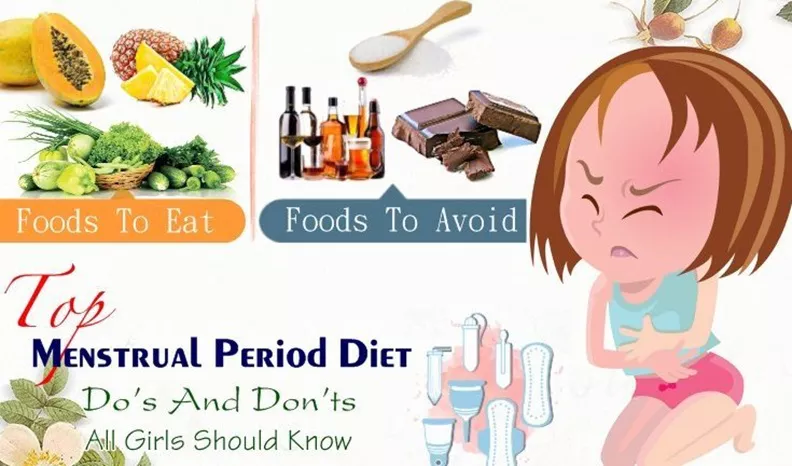Menstruation, a natural and vital part of a woman’s reproductive cycle, can be accompanied by a range of physical and emotional changes. While it’s essential to embrace and understand this monthly occurrence, there are certain things to avoid during menstruation to ensure a more comfortable and healthy experience. In this comprehensive guide, we’ll explore what to avoid during menstruation, from dietary choices to lifestyle adjustments, and provide insights into how to manage common menstrual symptoms more effectively.
I. Foods to Avoid
Caffeine and Sugary Beverages:
Caffeine can exacerbate menstrual discomfort, leading to increased cramps and mood swings. It’s wise to limit your intake of coffee, energy drinks, and soda during menstruation. High-sugar beverages can lead to energy crashes, making you feel even more fatigued.
Processed and Fried Foods:
Highly processed and fried foods, such as fast food and chips, can lead to bloating and water retention. These foods are often high in salt and unhealthy fats, which can worsen PMS symptoms.
Excessive Salt:
A high sodium diet can cause water retention and bloating. Reducing your salt intake during menstruation can help alleviate these symptoms.
Dairy Products:
For some women, dairy products can worsen menstrual cramps and digestive discomfort. Try to limit dairy consumption or opt for dairy alternatives during this time.
Fatty Meats:
Fatty cuts of meat can be harder to digest and may exacerbate gastrointestinal issues during menstruation. Lean protein sources like poultry or fish are preferable.
II. Lifestyle Habits to Avoid
Excessive Stress:
Chronic stress can intensify menstrual symptoms. Engage in relaxation techniques, such as yoga, meditation, or deep breathing exercises, to manage stress effectively.
Overexertion:
Intense physical activity can exacerbate cramps and fatigue. While light exercise can be beneficial, avoid strenuous workouts during menstruation.
Lack of Sleep:
Inadequate sleep can worsen mood swings and fatigue. Prioritize a good night’s sleep to help regulate your hormones and improve overall well-being.
Wearing Tight Clothing:
Tight clothing can constrict the abdomen and worsen discomfort. Opt for loose-fitting, comfortable clothing to allow for better circulation and movement.
Ignoring Hygiene:
It’s crucial to maintain proper hygiene during menstruation to prevent infections. Change your sanitary products regularly and follow recommended hygiene practices.
III. Beverages to Avoid
Alcohol:
Alcohol can disrupt hormonal balance and lead to worsened PMS symptoms. It can also contribute to dehydration, which should be avoided during menstruation.
Carbonated Drinks:
Carbonated beverages can cause bloating and discomfort due to the gas they introduce into the digestive system. Opt for still water or herbal teas instead.
Excessively Cold Drinks:
Drinking very cold beverages during menstruation can cause muscle contractions in the uterine area, leading to more significant cramping. It’s best to consume drinks at a moderate temperature.
IV. What to Avoid When Managing Menstrual Pain
Skipping Meals:
Skipping meals can lead to low blood sugar levels and worsen fatigue and mood swings. Ensure you have regular, balanced meals to maintain stable energy levels.
Self-Medication:
While over-the-counter pain relievers can be helpful, avoid excessive use, as it may lead to adverse side effects. Consult with a healthcare professional if you experience severe pain or discomfort.
Hot Baths or Showers:
Although hot baths or showers can provide relief, avoid excessively hot water, as it can lead to further discomfort and dehydration.
Neglecting Adequate Hydration:
Dehydration can exacerbate menstrual symptoms. Ensure you stay well-hydrated by drinking water, herbal teas, or electrolyte-rich beverages.
V. What to Avoid for Mental and Emotional Well-Being
Negative Self-Talk:
Menstruation is a natural process, and it’s essential to avoid negative self-talk or self-criticism during this time. Practice self-compassion and focus on self-care.
Isolation:
Isolating yourself during menstruation can lead to feelings of loneliness and sadness. Stay connected with friends and loved ones for emotional support.
Overloading Your Schedule:
Avoid overcommitting or overloading your schedule during menstruation. Give yourself time for self-care and relaxation.
Ignoring Mental Health:
If you experience severe emotional symptoms, consider speaking with a mental health professional who can provide guidance and support.
VI. What to Avoid in Personal Care
Scented Products:
Scented sanitary products or personal care items can irritate sensitive skin during menstruation. Opt for unscented and hypoallergenic options.
Tight Underwear:
Wearing tight or uncomfortable underwear can cause chafing and discomfort. Choose breathable, cotton underwear to prevent irritation.
Harsh Cleansers:
Harsh soaps and cleansers can disrupt the pH balance of the genital area. Use gentle, pH-balanced cleansers to maintain hygiene.
Ignoring Menstrual Hygiene Products:
It’s essential to use appropriate menstrual hygiene products to avoid leaks and discomfort. Familiarize yourself with various options, such as tampons, pads, or menstrual cups, and choose what suits you best.
Conclusion
Navigating menstruation is a unique experience for every woman, and it’s essential to prioritize self-care during this time. By understanding what to avoid during menstruation, such as specific foods, lifestyle habits, and personal care practices, you can effectively manage symptoms and ensure a more comfortable monthly cycle.























